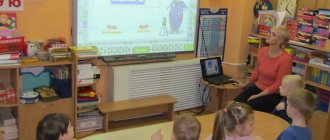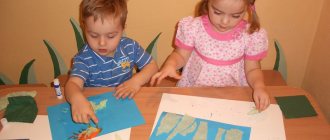Algorithm for introducing innovations in a preschool institution article
Algorithm for introducing innovation
The process of introducing innovation consists of several stages: diagnostic; prognostic; organizational; practical (implementation); generalizing; implementation
The diagnostic stage consists of a systematic analysis of the activities of a preschool educational institution based on monitoring and identifying the main contradictions in the educational process. The result of analytical activity is the identification of problems, the formation of a research topic and its justification. This stage also includes an analysis of the conditions available for conducting the research: personnel, material and technical, cultural-historical, socio-economic, etc. At this stage, the basis of the experiment and the participants in the educational and management process are determined.
The forecasting stage involves the development of a concept of innovation activity and its plan-program.
The concept is developed by a group of trained teachers under the leadership of the head or deputy head of educational work in consultation with the staff of the educational institution. An important procedure is to determine the goal, object, subject, hypothesis and objectives of innovation activity.
A goal can be considered as an expected result of an activity, expressed in positive changes in the educational process.
The goals and objectives of innovative activity are determined on the basis of a thorough analysis of the current situation in a preschool organization, on the one hand, and from development forecasts, on the other.
The selected goals and objectives in a comprehensive target program must be agreed upon at all levels, approved by the majority of the team, realistic, adapted to new conditions, increase the level of motivation and stimulation, and ensure control.
When thinking about the purpose of experimental work, it is recommended to answer the following questions: what do you want to implement, change or test? What do you want to get (create) as a result of innovation? When developing research objectives, it is advisable to determine: what actions need to be taken in order to achieve the goal, what intermediate results are necessary for this, and what steps should be taken.
Then the object and subject of research are determined.
The object of study is the pedagogical space, the area within which contains what will be studied.
The subject of research is the properties, relationships, functions identified in the object. This is the specific part of the object in which changes will directly occur, and on which pedagogical or managerial influence will be directed in the process.
A research hypothesis is a scientifically based assumption regarding the method of implementing the idea and design of the experiment, a system of measures for its implementation. In order for the hypothesis to be clearly defined, it is necessary to think about what exactly will be tested during the experiment, how its idea and design can be more successfully implemented, and what control actions need to be applied to implement the objectives of the experiment.
Next, it is necessary to determine the stages of innovation activity, their specific content, timing of implementation and expected results for each stage. An important point in developing the concept is the determination of indicators for assessing the effectiveness of innovations and monitoring their results.
Organizational stage. The need for this stage is associated with the educational institution obtaining the status of an innovation platform. To do this, the administration of the preschool educational institution carefully studies the following issues:
the state of the institution’s resources: financial, material and technical, information, personnel, regulatory, etc., necessary for organizing innovative activities;
the ability to attract additional resources to ensure innovative activities;
readiness of participants in the educational process for upcoming activities (their competence, motivation, creativity, etc.).
The next stage of work at the organizational stage is to go through the procedure for assigning the status of an innovation platform to an institution in the expert council. The expert council is formed by the education management body (federal, regional, municipal). For the expert council, the administration of the preschool educational institution is preparing a package of documents:
an application to assign the institution the status of an innovation site;
concept of innovation activity;
plan for innovation activity (for its entire period);
additional cost estimate for its organization and implementation.
Competent teachers with a high level of qualifications take part in the implementation of the innovation activity program.
A creative group is created in an educational institution, which includes: a scientific supervisor (if the innovation is scientific and experimental in nature), the head of a preschool educational institution, a deputy head for educational work or a senior educator, teachers participating in innovative activities, representatives of educational authorities . The head of the institution issues an order approving the composition of the creative group, regulations are developed on the activities of the creative group to implement the innovation in the preschool educational institution, and a schedule for introducing the innovation is developed.
The task of the creative group is to exercise internal control over the progress and results of innovation activities. The creative group hears reports from participants in innovation activities at its meetings, makes adjustments to its organization, develops criteria and procedures for assessing the effectiveness of innovation activities.
The organizational stage involves the development of a new edition of the Charter of the preschool educational institution, the distribution of management functions, and the development of job descriptions for all participants in innovation activities.
An important point at this stage is the development of a plan for advanced training of teachers, specialists, parents and other participants in the experiment. Innovative activities require an in-depth study of scientific and methodological literature, the development and mastery of new ways of working with children, mastering research methods, etc. The organization of this activity is carried out by the scientific supervisor (consultant, if he is involved in the innovation process) and the deputy head of the educational part of the preschool institutions.
This stage also includes the preparation of scientific and methodological support: preparation of a specific program, presentation of the technology of innovation, preparation of methodological developments and teaching aids, materials related to the management of innovation.
Practical (implementation) stage. Work at this stage begins with determining the initial level of the state of the problem chosen for innovation activity. For this purpose, system diagnostics of the state of the pedagogical process in experimental and control groups is used[1]. To study the initial state of the pedagogical process in preschool educational institutions, the most adequate research methods are selected to help diagnose, analyze and summarize the results and bring them to the attention of all participants in the pedagogical process. Based on the results obtained, the hypothesis can be adjusted and changes made to the innovation program.
The practical stage of the research is the consistent implementation of an innovative project, the collection and analysis of various research materials indicating the dynamics of the educational process, their systematic discussion at meetings of the scientific and methodological council, solving problems that arise during the work, and timely making adjustments to the course of the research.
To obtain more objective and reliable results about the impact of a particular technology on the development of a child (teachers and specialists, the educational process, management models, etc.), the results are compared with control groups of children, teams of teachers, and other management models. It is important that the objects taken for control work in similar socio-economic, personnel and other conditions. The difference between one object and another lies in the fact that in the control object the work is carried out according to different rules, usual for mass practice.
The practical (implementation) stage usually lasts for a long time. The total duration of innovation activity depends on the specifics of the problem being developed.
The generalizing stage of innovation activity is the processing of the received materials, namely: their qualitative and quantitative analysis based on the developed evaluation criteria; correlation of results with set goals, objectives and scientific assumptions; description of the progress and results of innovation activities; formulating conclusions about the confirmation or fallacy of the hypothesis. Positive results of innovation activities confirm the hypothesis. The consequence of this are facts, established patterns, obtained by researchers in the course of their work. Credibility and objectivity
The results are confirmed by the final diagnosis.
Implementation stage. At this stage, innovative technologies are being disseminated within the team of a given institution or outside it (district methodological Center, etc.). The results of innovative activities can be presented in the form of reports at pedagogical councils, scientific and practical conferences, and also published in specialized literature.
Thus, the introduction of innovation requires the transfer of management activities and methodological work into its new state - the innovation space. In understanding the essence of innovative processes in education, there are two most important problems of pedagogy - the problem of studying, generalizing and disseminating advanced pedagogical experience and the problem of introducing the achievements of psychological and pedagogical science into practice.
[1] To study the level of mastery of educational programs and the characteristics of children’s development, you can use a number of manuals: “Preparing for certification” (St. Petersburg, 2004); “Self-assessment of a manager’s performance as a factor in improving the quality of management of a preschool educational institution” by L.M. Manevtsova and S.S. Lebedeva (2002), etc., related to a specific research topic



